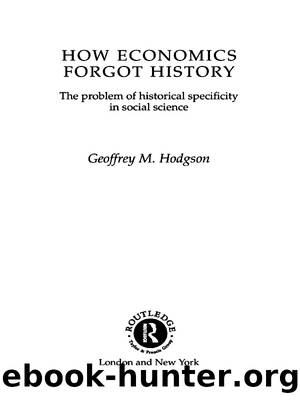How Economics Forgot History by Hodgson Geoffrey Martin

Author:Hodgson, Geoffrey Martin
Language: eng
Format: epub
Publisher: Taylor & Francis (CAM)
Published: 2011-08-31T00:00:00+00:00
1 Much later, when Ayres (1958) claimed that his own ideas were a development of those of Veblen, he dismissed Veblenâs instinct theory as of little ultimate significance. Although Ayres was right to point out that Veblen failed to define instinct adequately, nevertheless, contrary to Ayres, instinct psychology remained foundational to Veblenâs position. See especially Veblen (1914).
2 Hobhouse was also a major influence on Hobson, who wrote a biography on his mentor with Ginsberg, Hobhouseâs successor at the LSE (Hobson and Ginsberg, 1932). Incidentally, Ginsberg (1932) went against the sociological trend of the time by attempting to retain some links between psychology, biology and sociology. He also maintained a notion of instinct in his analysis.
3 For a history of the department before the Second World War, see Mason and Lamont (1982).
4 The choice between Weber, Sombart and Marx must also be placed in the dramatic and global political context of the 1930s. Clearly, of the three, Weber was the closest to an American-style liberal. However, to make him one, his German nationalism and pessimistic views on progress would have to be overlooked (Hennis, 1988; Mommsen, 1984). Nevertheless, Zaret (1980, p. 1193) argued convincingly that Parsonsâs ideological reaction against Marxism was significant and that âParsons saw in Weberâs writings a non-Marxian foundation for general theory.â
5 In turn, and on this score, Henderson had been influenced by Whitehead, who was also at Harvard, and is widely regarded as a key inspiration in the development of systems theory (J. Miller, 1978).
6 To some considerable degree, however, the allegation was true of Ayres, who embraced behaviourist psychology and twice wrote â albeit with some qualification â that âthere is no such thing as an individualâ (Ayres, 1918, p. 57; 1961, p. 175). Again we may point to the likelihood that Parsonsâs understanding of Veblenâs thought was very much the questionable version that had been taught by Ayres. On some of the defects of Ayresâs interpretation of Veblen see Hodgson (1998e).
7 See Tilman (1992, pp. 170â4) for a discussion of some more of Parsonsâs criticisms of Veblen, mainly from the postwar period.
8 As another example of Parsonsâs idiosyncratic use of philosophical terminology, consider the term âemergenceâ. Although he used it, Parsons never clearly defined the concept. In a key passage in the Structure of Social Action where he came closest to a definition, he saw emergent properties as âa measure of the organicism of the systemâ (Parsons, 1937a, p. 749). However, Parsonsâs notion of emergence as a âmeasureâ has nothing to do with the concept as it is developed in the works of Whitehead, Lloyd Morgan, William McDougall and others. Their concept of emergence concerns the existence of properties of an entity at one ontological level, which are not reducible to or predictable from the lower-level properties of its components.
9 Note that Schumpeter (1954, pp. 15, 20â1, 819) endorsed a similar but not identical demarcation between the two disciplines. His definition of âeconomic theoryâ or âeconomic analysisâ was narrow and similar to that of Robbins, consigning the âanalysis of economic institutionsâ to âeconomic sociologyâ.
Download
This site does not store any files on its server. We only index and link to content provided by other sites. Please contact the content providers to delete copyright contents if any and email us, we'll remove relevant links or contents immediately.
International Integration of the Brazilian Economy by Elias C. Grivoyannis(111059)
The Radium Girls by Kate Moore(12028)
Turbulence by E. J. Noyes(8049)
Nudge - Improving Decisions about Health, Wealth, and Happiness by Thaler Sunstein(7706)
The Black Swan by Nassim Nicholas Taleb(7129)
Rich Dad Poor Dad by Robert T. Kiyosaki(6632)
Pioneering Portfolio Management by David F. Swensen(6300)
Man-made Catastrophes and Risk Information Concealment by Dmitry Chernov & Didier Sornette(6019)
Zero to One by Peter Thiel(5802)
Secrecy World by Jake Bernstein(4753)
Millionaire: The Philanderer, Gambler, and Duelist Who Invented Modern Finance by Janet Gleeson(4478)
The Age of Surveillance Capitalism by Shoshana Zuboff(4292)
Skin in the Game by Nassim Nicholas Taleb(4248)
The Money Culture by Michael Lewis(4207)
Bullshit Jobs by David Graeber(4190)
Skin in the Game: Hidden Asymmetries in Daily Life by Nassim Nicholas Taleb(4006)
The Dhandho Investor by Mohnish Pabrai(3765)
The Wisdom of Finance by Mihir Desai(3747)
Blockchain Basics by Daniel Drescher(3583)
